
views
Preventing the Common Cold and Flu

Wash your hands with warm water and soap. Wet your hands, then apply soap. Work the soap into a lather for at least 20 seconds, then rinse away the soap. The cold virus is easily spread through touch, but washing your hands can remove the germs. Use your towel to open doors after you wash your hands, and use antibacterial wet wipes as necessary. Wash your hands thoroughly after you: Ride the subway, bus, or train Go to the grocery store or any other highly-trafficked store Go to school or work Go to a public restroom Use gym equipment
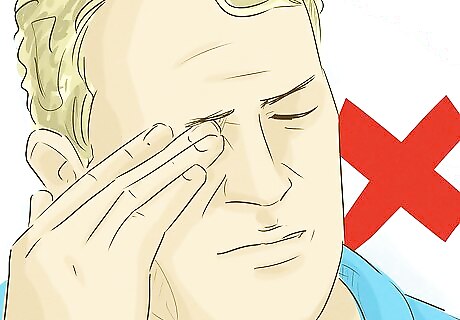
Don't touch your eyes, nose, and mouth before washing. Touching banisters and elevator buttons is unavoidable, but you can avoid touching your eyes, nose, and mouth. Touching these parts of your face makes it easy for the cold or flu to get into your system. Don't rub your eyes, wipe your nose, or lick your fingers before you get a chance to wash your hands with warm water and soap. Antibacterial gel and wipes are handy to have around for when there's not a facility nearby to wash your hands. It's also a good idea to use your sleeve to cover your hands when you must touch items like banisters and elevator buttons. If you must wipe your nose or touch your face, cover your hand with a tissue - or worst case, a sleeve - to avoid transmitting germs directly from your fingers to your face.
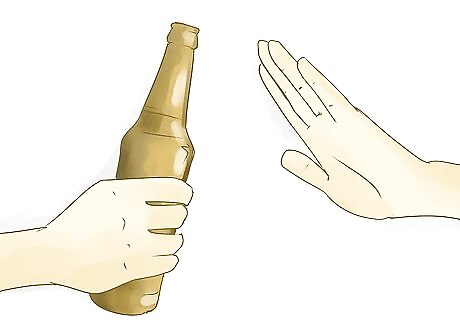
Don't share food and drinks with others. During cold and flu season, it's best to turn down offers to share food and drinks. Coming into contact with someone else's saliva or mucus is a sure way to catch whatever virus they might be incubating. Use your own utensils and get your own cup instead of sharing with someone else. If you or someone you know is sick, it's best to use disposable cups while contagious. The germs can linger on a cup even after it's washed, especially if it's hand washed.
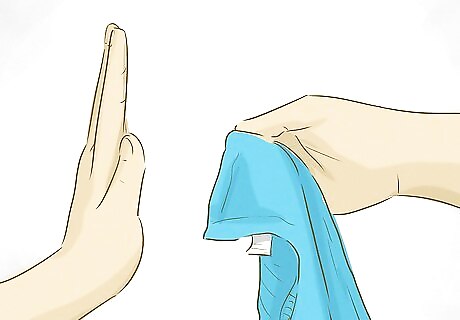
Avoid sharing personal items. Maybe it's obvious that you shouldn't use someone else's toothbrush, but there are other personal items you should also avoid sharing. Don't use someone's razor, nail clippers, and other items that come into contact with their bodily fluids. While germs might not survive on these items for long, it's not worth the risk. The same goes for sharing towels, washcloths, and even bedding items, like sheets and pillowcases. These items can all pass along someone else's cold or flu germs. Washcloths and towels are especially important, particularly when it comes to children. Make sure each person has their own. Don't share people's makeup, either. Using someone else's lipstick, eyeliner, mascara, and foundation could transfer their germs to your face. Avoid using someone else's cell phone and sanitize your own frequently.
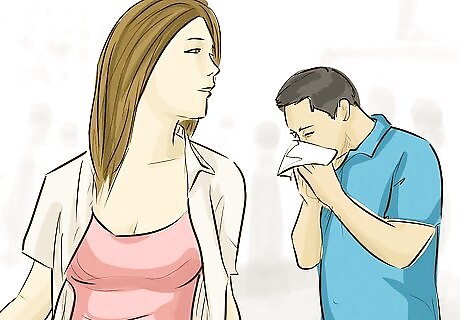
Try to stay away from people who are sick. Cold and flu germs are easily transmitted through the air via droplets exhaled by the infected person. You can contract the infection from being near them, even if you don't touch them or anything else they touched. If you think that someone may be ill, it's a good idea to keep a safe distance while you're interacting with that person.. Do not be in an enclosed space with a sick person. Similarly, move away if someone is coughing or sneezing in public. You could also consider wearing a face mask when you go out to filter out bacteria and viruses.
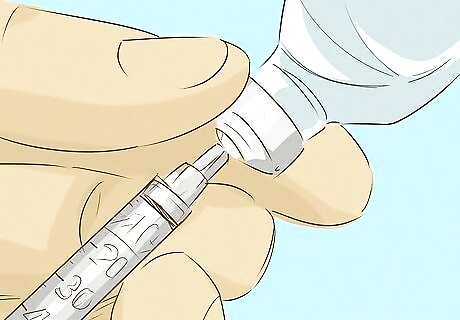
Get a flu shot. One smart preventative measure is to get a flu shot, which many people find keeps them well until flu season passes. If you do still get the flu, you likely won't get as sick. It's important to get a new flu shot every year, as there are different strains each year. Flu shots are formulated for the most common strains making the round that year. See your doctor to get a flu shot, or visit a local pharmacy to get one at a discount. Flu season usually occurs throughout fall and winter. It often begins in October or November, with cases peaking in January and February. Different flu shots are approved for different groups of people. Some are meant to be administered only to people 18 years or older, while others are designed for children or babies. Be sure to go to a professional clinic to get the right type of shot. If you are considered "high risk," you should definitely get a flu shot. The "high risk" category includes the following groups: people over age 65, children between the ages of 6 months and 5 years, pregnant people, people on immune suppressants, and people with certain medical conditions, such as asthma, COPD, heart failure, cancer.
Strengthening Your Immune System

Eat plenty of vitamin-rich foods. No matter what type of illness you're trying not to catch, you can give yourself the best chance of staying healthy by having a diet rich in essential vitamins and minerals. People who are malnourished experience higher rates of disease and illness. Make sure your diet includes the following components, all of which have been linked to immune system health, to keep your immune system strong: Vitamin A. Eat carrots, sweet potatoes, leafy greens, squash, apricots, and melons. Vitamin B. Eat beans, vegetables, poultry, fish, and meat. Vitamin C. Eat papaya, broccoli, bell peppers, oranges, kiwi, strawberries, and brussels sprouts. Vitamin D. Get plenty of sun and eat salmon, herring, and soy. Vitamin E. Eat almonds, walnuts, sunflower seeds, wheat germ, and peanut butter. Selenium. Eat tuna, shrimp, salmon, turkey, chicken, and other fish. Zinc. Eat seafood, beef, wheat germ, spinach, and cashews.
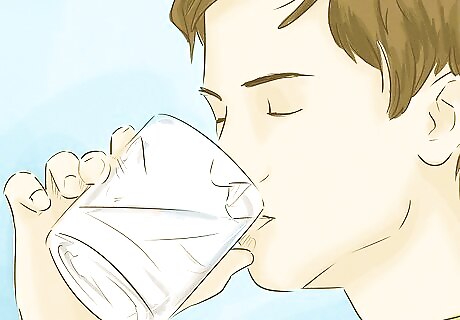
Stay hydrated. Drinking enough water - and getting water through fruits and vegetables - is essential to keeping your immune system strong and helping your body expel germs. Drink 8 cups a day to keep yourself in good health, and increase your intake when you feel an illness coming on. Make sure you stay hydrated from morning until night.

Get rest. You've probably experienced this scenario: you pulled two all-nighters in a row, and on the third day you came down with a cold. Sleep deprivation makes the body less able to combat illness, and more susceptible to getting sick in the first place. Aim to get at least 7 - 8 hours every night.

Reduce the amount of stress you're under. Stress can lower your immune system's response to germs and bacteria that can cause infection. It can also make it harder for you to sleep, which also harms your immune system. Take time every day to relax and do self care activities. Meditate to lower your stress. Use breathing exercises to calm down when stress arises. Engage in fun hobbies, like painting, reading, or playing recreational sports. Express yourself creatively. Eat well.
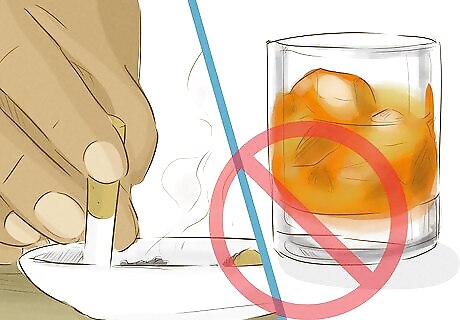
Cut back on drinking and smoking. Drinking alcohol and smoking lead to a host of health problems, and they exacerbate common illnesses as well. If you're feeling a little under the weather, pass on going out for drinks or smoking cigarettes. Drink water, eat a good meal, and go to bed early instead, and you just might be able to avoid getting sick.

Make exercise a priority. Daily exercise is best, but if you can't commit to a daily routine, try to include exercise in your regimen at least three times per week. Working out keeps your oxygen supply going, detoxifies your body, and simply strengthens your body inside and out.
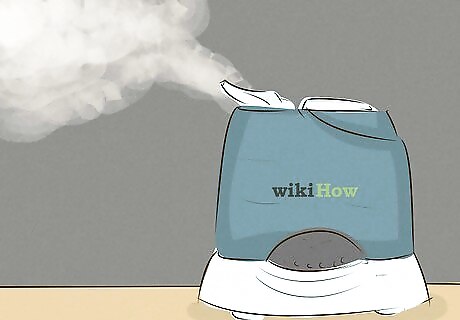
Harness the power of steam to moisten mucus membranes. Add moisture to the air through technology (vaporizer, humidifier) or the old-fashioned way (pots of hot water). When the air around you gets very dry, your body's mucus membranes tend to dry out. Although mucus may seem nasty and useless, it's incredibly important: it contains lots of helpful antibodies that are designed to prevent illness. Get just the right amount of humidity in the air. Try to keep the humidity between 30% and 50% in the summer, and between 30% and 40% in the winter. Dip below 30% humidity and the mucus gets too dry; go above 50% and you're prone to giving yourself a different set of health problems. If you're unsure about the humidity level in your home, you can test the humidity using a humidity meter, also called a hygrometer. You can usually find one of these in a home improvement store, a pet store, or online.
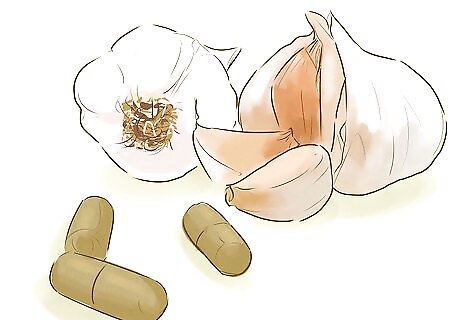
Use immune-boosting herbs. While most herbs haven't been proven to prevent sickness, there are a few that seem to help. There's no harm in drinking herbal tea and incorporating herbs into your diet in order to give yourself the best chance to avoid sickness. Try the following healthy herbs: Garlic has been shown to help prevent infection. Ginseng is said to boost immune function. Probiotics help with digestion and to prevent infection. Echinacea is commonly used as a preventative measure against colds.#*Zinc supports immune system health. Vitamin C is also essential for a healthy immune system.
Avoiding Diseases

Get appropriate vaccinations. Many illnesses can be prevented by vaccines administered during childhood or later in life. If you aren't vaccinated against common illnesses, or you aren't sure whether your vaccinations are up to date, talk with your doctor about getting vaccinated. One of the most important vaccines you can get is for pneumonia. Although you may have been vaccinated against an illness as a child, your doctor may advise you to get a booster shot as an adult. Some vaccines, such as the Tetanus shot, require boosters in order to remain effective. Similarly, your doctor will likely recommend new vaccines that weren't given to you when you were young. For example, shingles can be a devastating illness, but there is a vaccine for it that’s covered if you’re over 50 years old.

Take precautions when traveling. If you're planning to travel to another country, look into whether you should take precautions to keep from getting sick. You won't be used to the food and water there, and you'll be exposed to new pathogens. Take the following precautions: Visit a doctor to get vaccines and preventative medication if you're going to a place where malaria, tuberculosis, and other illnesses are easy to contract. Find out what food and water is safe to eat and drink in the region where you're traveling. You might want to bring your own provisions to be on the safe side. Bring a mosquito net if you're going to a place where malaria is commonly spread. In some cases, you may also need to take quinine to prevent malaria.
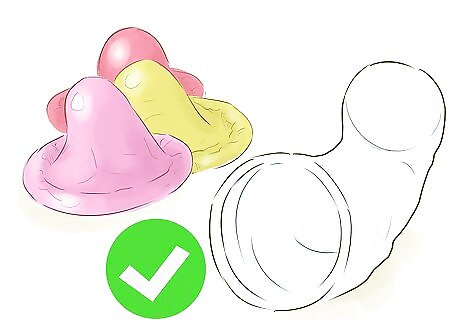
Practice safe sex. Sexually transmitted infections (STIs) can be prevented if you take precautions. Be sure to use a condom or another barrier that prevents the transmission of STIs during sex. If you have a long-term partner, you and your partner should both get tested for common STIs.




















Comments
0 comment